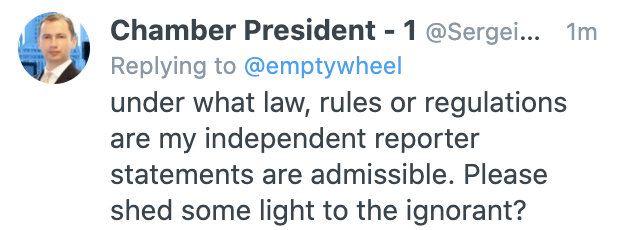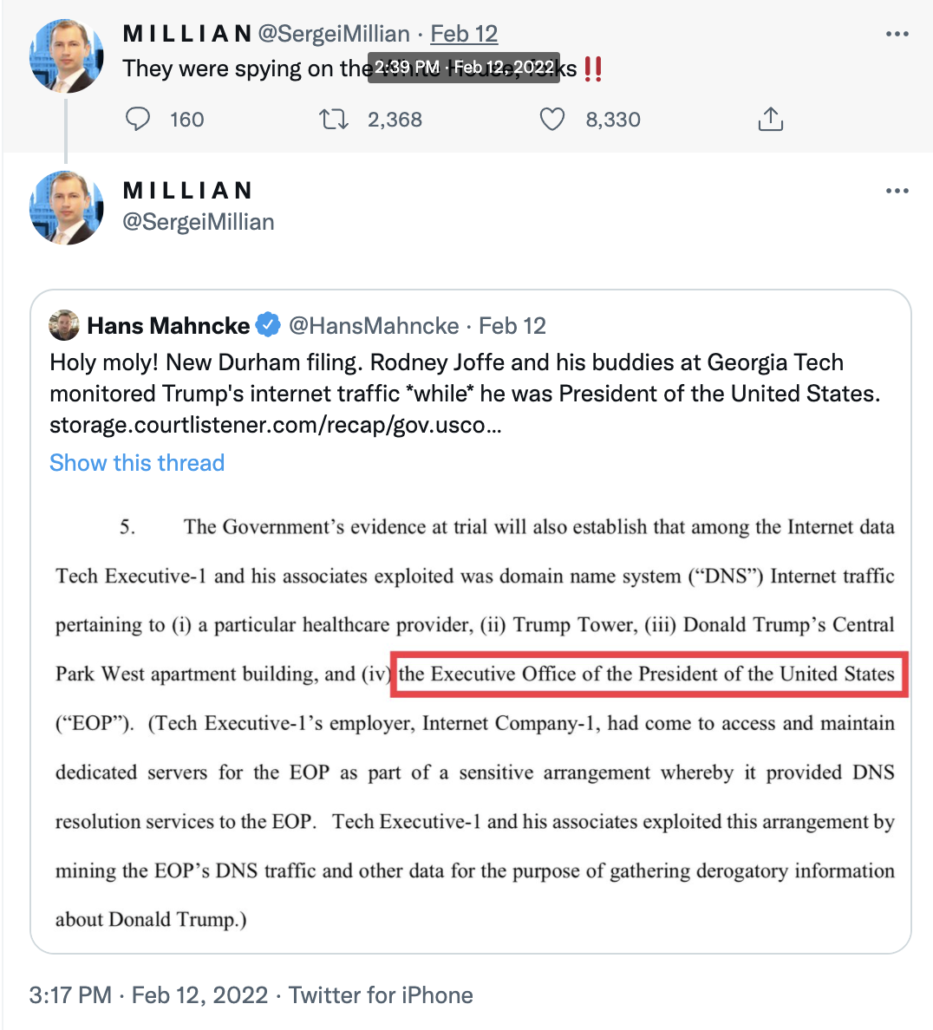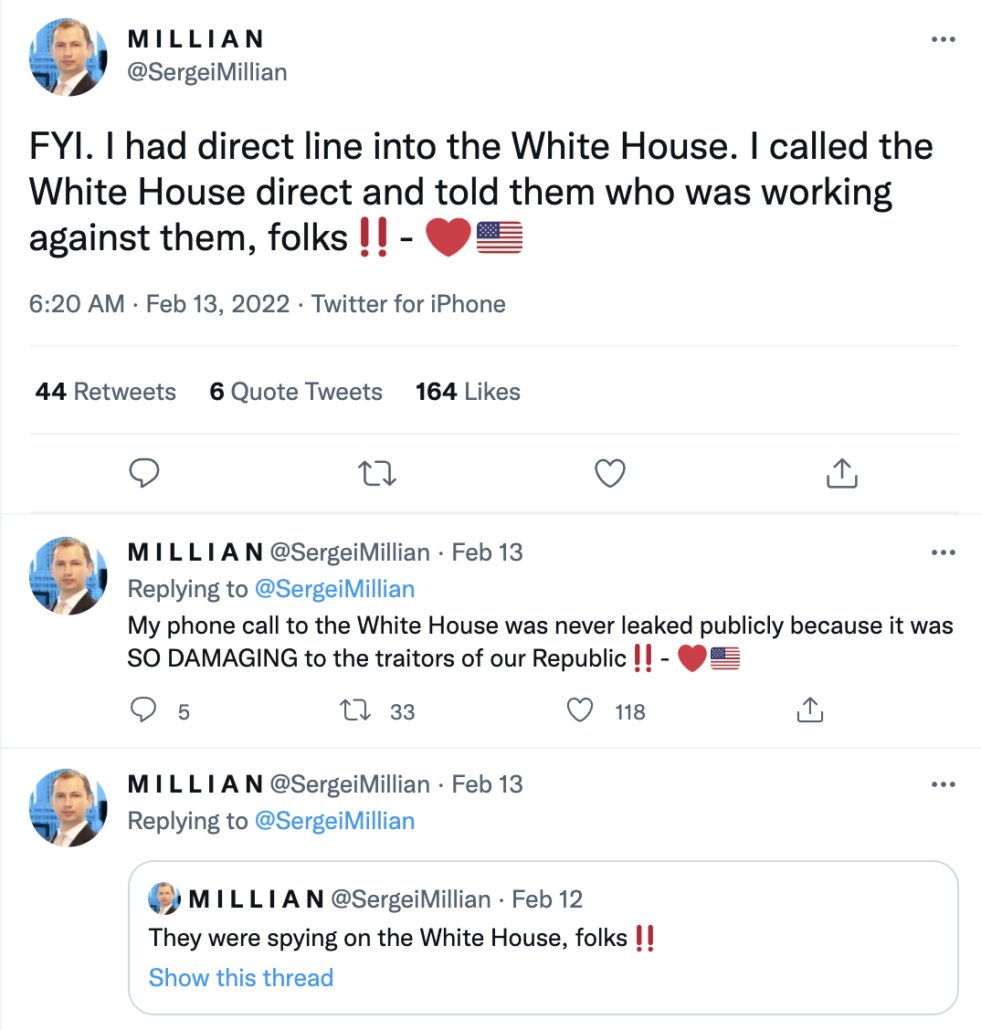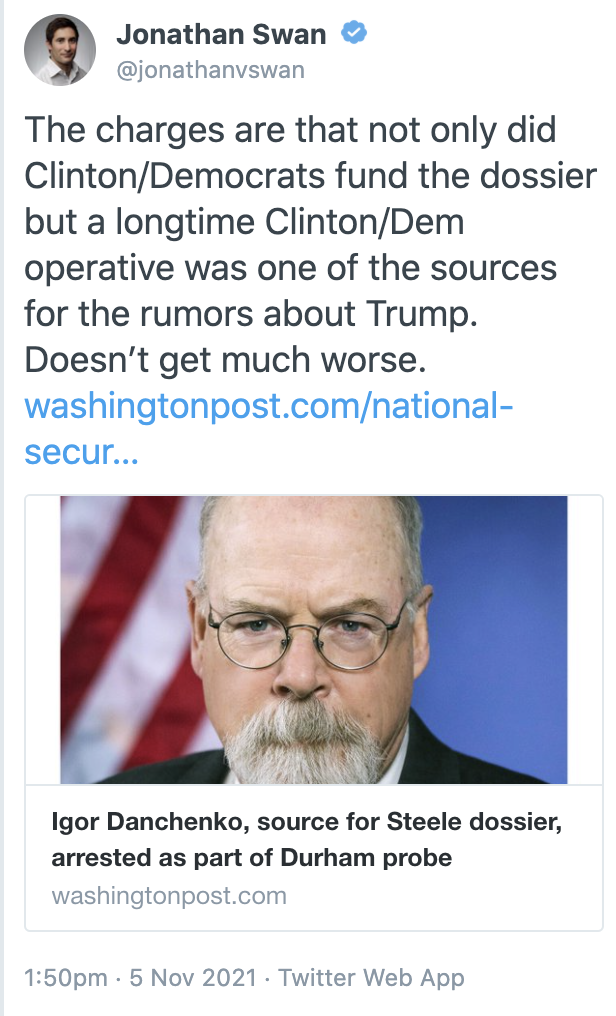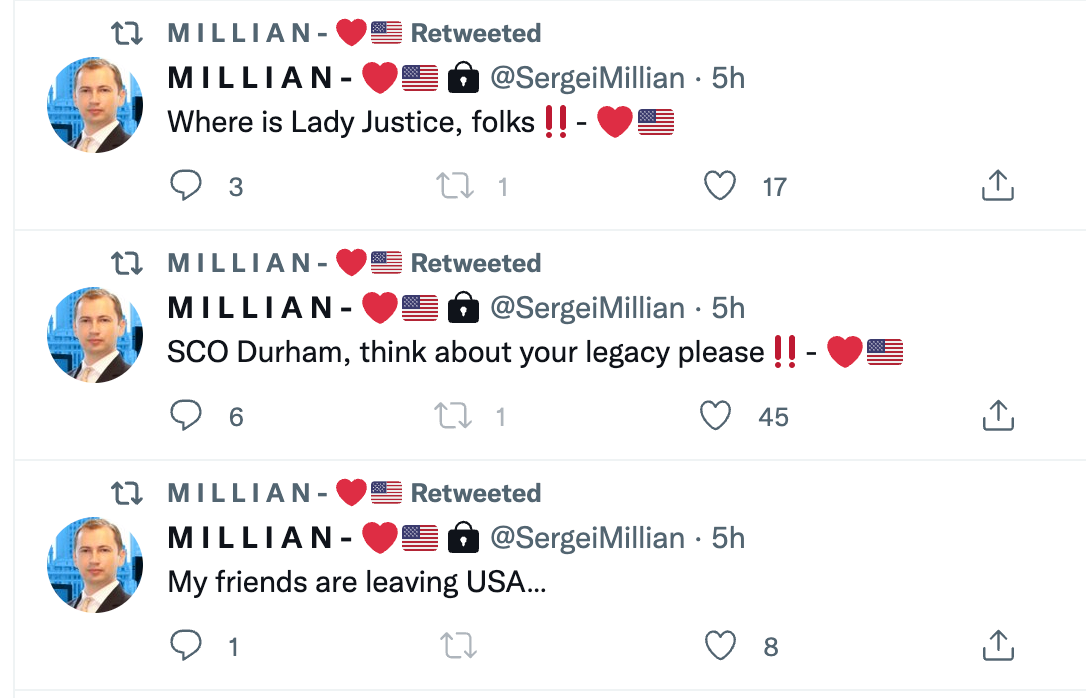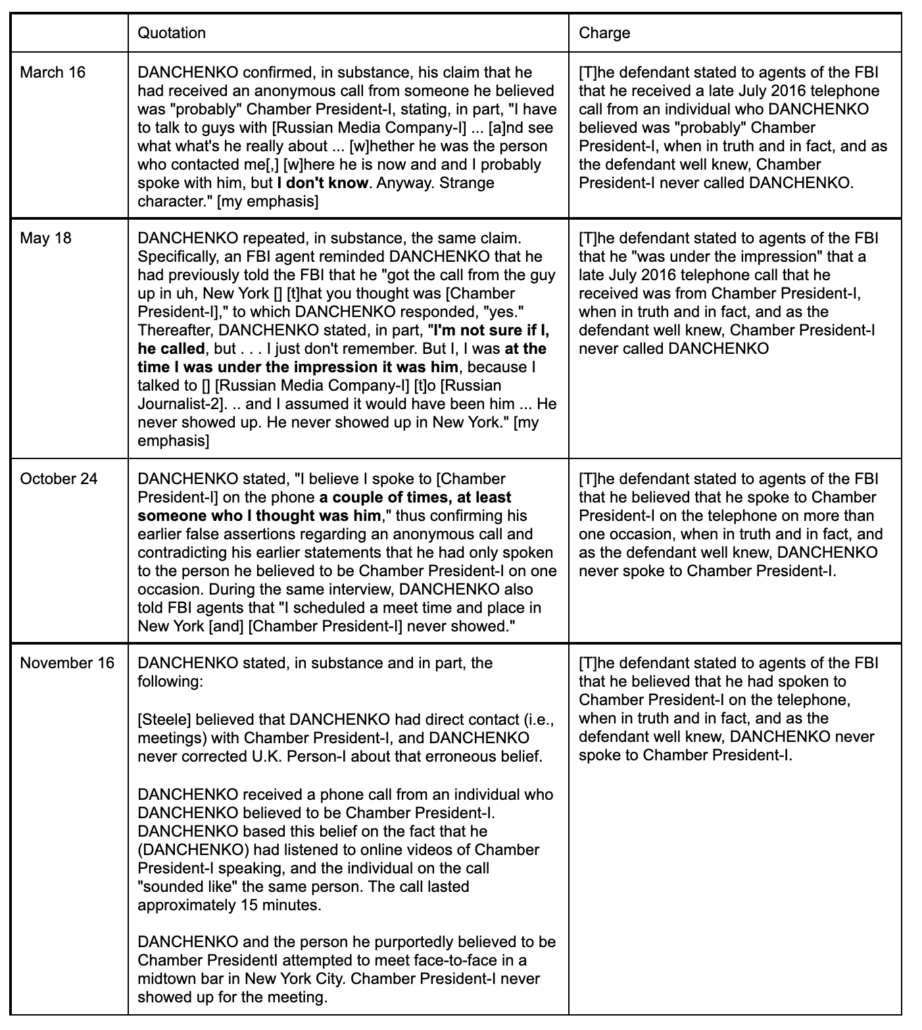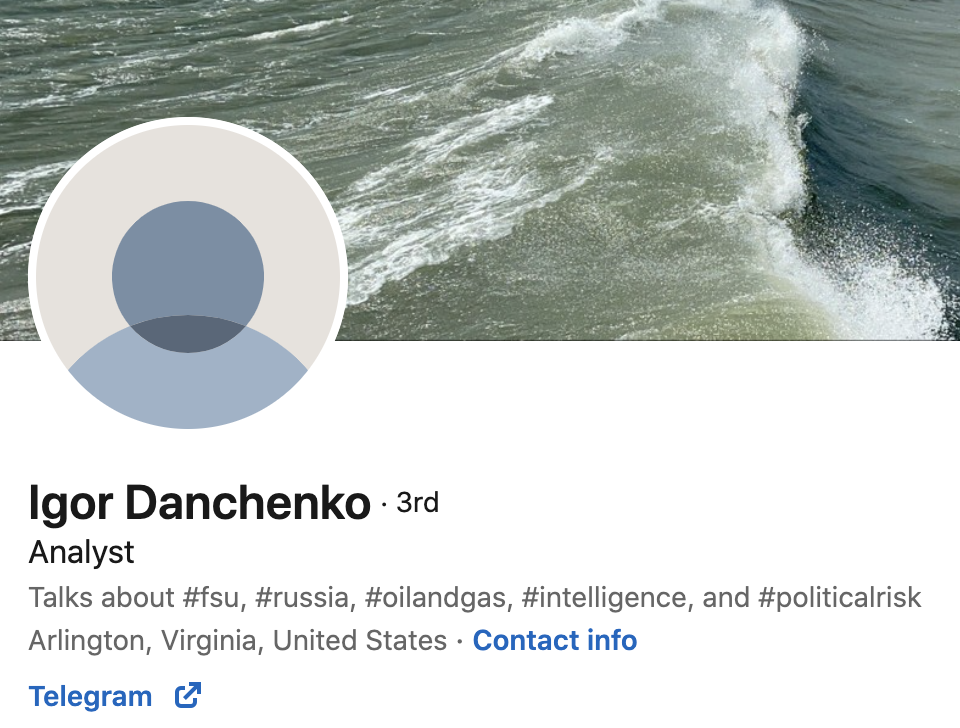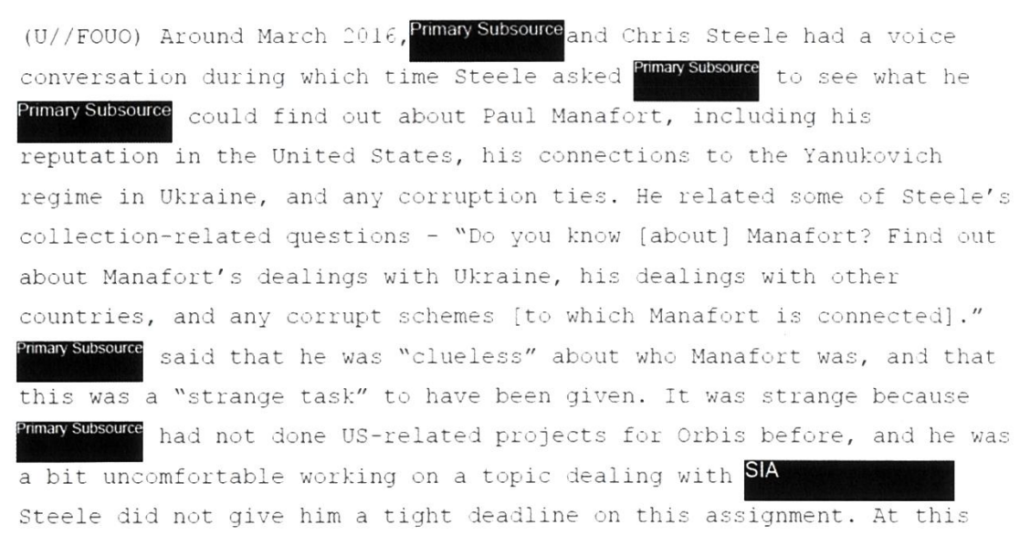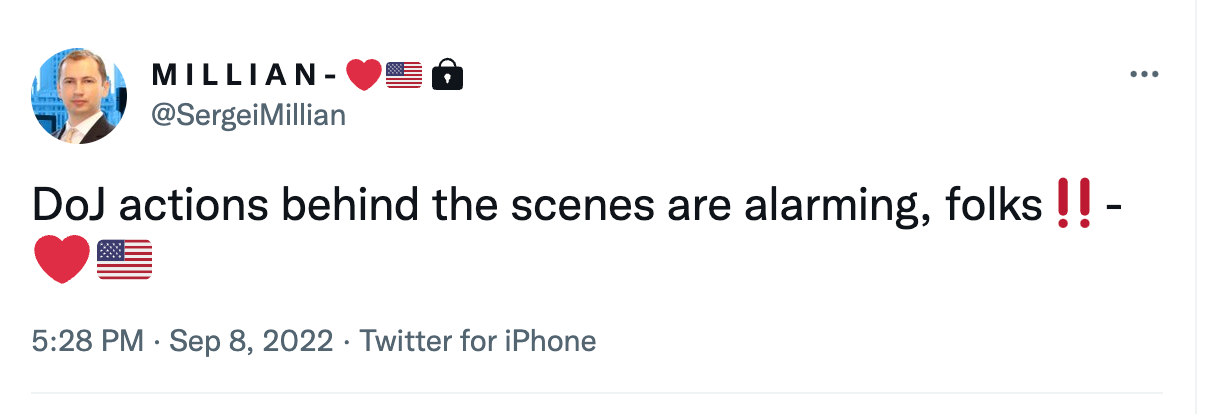Doo-Doo Process: John Durham Claims to Know Better than Anthony Trenga and Two Juries
There’s something grotesque and unethical about John Durham’s conduct that has gotten little attention.
After getting his ass handed to him by two juries and one judge, in his report, Durham nevertheless repeated the allegations against Michael Sussmann and Igor Danchenko on which they have been acquitted. While in one discussion of his prosecutorial decisions, Durham described these as “allegations,” in his executive summary and elsewhere, he stated, as fact, that both men had made false or fabricated statements. Worse still, in his efforts to sustain his false statements allegations, Durham himself makes claims that were rebutted or undermined by the trial records.
John Durham lies about press contacts to cover up his failure to investigate exculpatory information
As a reminder, the researchers who found the Alfa Bank anomaly found it organically, and out of a suspicion — later validated by at least three Mueller prosecutions (Paul Manafort, Michael Cohen, and Alex Van der Zwaan) — that Trump and his associates were lying about their ties to Russia, Rodney Joffe shared the Alfa Bank anomaly with Michael Sussmann.
Sussmann definitely packaged up the allegations and asked Fusion GPS what they knew about Alfa Bank. He definitely billed that packaging-up process to Hillary. The campaign definitely approved sharing that information with the NYT.
But then, without the consent of the campaign, Sussmann blew their big story, by sharing the allegations with the FBI.
Sussmann claimed that he did so because, as a former cybersecurity prosecutor, he knew that if DOJ were going to have a chance to investigate these allegations, they would need to do so, covertly, before the allegations went public. He claimed to have done so because he had been in the position where a big allegation broke before law enforcement had an opportunity to investigate. As proof to support this claim, Sussmann noted — and over the course of months, forced Durham to collect the heretofore ignored evidence proving — that he helped the FBI kill the NYT story the campaign had approved, in the process making it clear that he had to ask someone (Joffe’s) consent to do so.
Because the FBI used overt means to investigate these allegations — a violation of DOJ pre-election guidelines that Durham doesn’t mention in his screed about the FBI — a seeming response to NYT’s efforts which was actually a response to the FBI bigfooting helped to fuel the story. The record shows, and Durham’s most aggressive prosecutor conceded at closing arguments, that the FBI fucked up this investigation in other ways, yet more FBI shortcomings that Durham doesn’t mention in his screed.
After the election, at a time when Sussmann no longer worked for Hillary, Joffe asked him to try to get the CIA to look at these anomalies. Before that meeting, Sussmann told one of his CIA interlocutors that he did have a client (something Sussmann also told to Congress), but described that his client wanted anonymity because of concerns about Russian retaliation. In the meeting where he passed off his thumb drives, he said he was not representing a client.
Those are the competing signals on which Durham obtained a criminal indictment and did so before having consulted significant swaths of directly relevant evidence: a question about how Sussmann intended those words, “represent” and “on behalf of,” a problem with the indictment that Sussmann identified immediately.
Here’s how Durham presented the Sussmann charges in the Executive Summary (all bold in this post my own).
The Office also investigated the actions of Perkins Coie attorney Michael Sussmann and others in connection with Sussmann’s provision of data and “white papers” to FBI General Counsel James Baker purporting to show that there existed a covert communications channel between the Trump Organization and a Russia-based bank called Alfa Bank. As set forth in Section IV.E.1.c.iii, in doing so he represented to Baker by text message and in person that he was acting on his own and was not representing any client or company in providing the information to the FBI. Our investigation showed that, in point of fact, these representations to Baker were false in that Sussmann was representing the Clinton campaign (as evidenced by, among other things, his law firm’s billing records and internal communications). 42 In addition, Sussmann was representing a second client, a technology executive named Rodney Joffe (as evidenced by various written communications, Sussmann’s subsequent congressional testimony, and other records).
Cyber experts from the FBI examined the materials given to Baker and concluded that they did not establish what Sussmann claimed they showed. At a later time, Sussmann made a separate presentation regarding the Alfa Bank allegations to another U.S. government agency and it too concluded that the materials did not show what Sussmann claimed. In connection with that second presentation, Sussmann made a similar false statement to that agency, claiming that he was not providing the information on behalf of any client.
[snip]
As explained in Section IV.E. l .c.i, the evidence collected by the Office also demonstrated that, prior to providing the unfounded Alfa bank claims to the FBI, Sussmann and Fusion GPS (the Clinton campaign’s opposition research firm) had provided the same information to various news organizations and were pressing reporters to write articles about the alleged secret communications channel. Moreover, during his September 2016 meeting at the FBI, Sussmann told Baker that an unnamed news outlet was in possession of the information and would soon publish a story about it. The disclosure of the media’s involvement caused the FBI to contact the news outlet whose name was eventually provided by Sussmann in the hope of delaying any public reporting on the subject. In doing so it confirmed for the New York Times that the FBI was looking into the matter. On October 31, 2016, less than two weeks before the election, the New York Times and others published articles on the Alfa Bank matter and the Clinton campaign issued tweets and public statements on the allegations of a secret channel of communications being used by the Trump Organization and a Russian bank – allegations that had been provided to the media and the FBI by Fusion GPS and Sussmann, both of whom were working for the Clinton campaign. [my emphasis; link]
And here’s how Durham presented his prosecutorial decision.
Accordingly, Sussmann’s conduct supports the inference that his representations to both the FBI and the CIA that he was not there on behalf of a client reflect attempts to conceal the role of certain clients, namely the Clinton campaign and Joffe, in Sussmann’s work. Such evidence also further supports the inference that Sussmann’s false statements to two different agencies were not a mistake or misunderstanding but, rather, a deliberate effort to conceal the involvement of specific clients in his delivery of data and documents to the FBI and CIA. [link]
[snip]
First, and as noted above, we identified certain statements that Sussmann made to the FBI and the CIA that the investigation revealed were false. Given the seriousness of the false statement and its effect on the FBI’s investigation, a federal Grand Jury found probable cause to believe that Sussmann had lied to the FBI and charged him with making a false statement to the Bureau, in violation of 18 U.S.C. § 1001. 1675 Ultimately, after a two-week trial, a jury acquitted Sussmann of the false statement charge.
We also considered whether any criminal actions were taken by other persons or entities in furtherance of Sussmann’s false statement to the FBI. The evidence gathered in the investigation did not establish that any such actions were taken. [link]
As noted above, just in these two passages Durham repeats, five times, that Sussmann made false statements, even though he never charged Sussmann with making false statements to the CIA and even though a jury found Sussmann not guilty of making false statements to the FBI (Durham also misrepresents that the billing evidence presented at trial, which didn’t show Sussmann billing Hillary for the meeting with Baker). This is a gross assault on due process, to accuse a man anew of the charges for which he has already been acquitted.
Durham claims, in explaining why he charged this flimsy case, that the [alleged] “false statement” was serious and had what he insinuates was a major effect on the FBI investigation. Remember: When Durham made this prosecutorial decision, he still had never bothered to check two Jim Baker phones in DOJ IG possession (one of which he had learned about years earlier), texts in Baker’s iCloud account that complicated his case, and documents in DOJ IG’s possession showing that the FBI understood — whether true or not — that the Alfa Bank allegation came from the DNC. Indeed, Durham obscures that while those Baker texts did show that Sussmann had conveyed such a claim by text, those belatedly discovered texts undermined Durham’s case at trial that Sussmann had repeated the claim in person (without providing any clarity about how Sussmann meant “on behalf of”). And one possible explanation for the acquittal is that the jury found that Sussmann didn’t repeat his claim that he was representing no client at the face-to-face meeting with Baker. Certainly, the record showed that whatever memory Baker had of that meeting had been selectively reconstructed with Durham’s help to match the story he needed to sustain a certain narrative, one that didn’t line up with the documentary evidence.
And evidence presented at trial completely undermined the claim that this was a material false claim, the reason Durham made the claim about seriousness in the first place. Sussmann’s attorneys showed that only the threat of prosecution altered FBI Agent Ryan Gaynor’s memory — backed by his contemporaneous notes — that, in fact, he always understood that the allegation came from a DNC attorney. Durham’s star FBI witness admitted on cross-examination that he developed his belief that a reference to the DNC in his colleague’s Lync texts was just a typo after prosecutor Andrew DeFilippis coached him on that point. There were other Lync texts recording a belief that the tip had come from the DNC. Several people at the FBI conducted this investigation as if they understood it to be an investigation of a DNC tip, which likely contributed to the errors the FBI made in their investigation. Durham claims the opposite.
Durham seems to hang his claim about seriousness on his own two inferences — one on top of another — that Sussmann had to have been deliberately hiding something, even though evidence presented at trial, most notably that Sussmann offered up information about having a client with both the FBI and CIA, undermined those inferences. As noted, Durham found April Lorenzen’s inferences as a private citizen to be potentially criminal, but he puts the weight of DOJ behind inferences that proved less robust than Lorenzen’s own.
Particularly given the fact that Durham only belatedly, months after indicting Sussmann, discovered evidence corroborating Sussmann’s explanation for reaching out to Baker — that he helped the FBI kill the NYT story the campaign very much wanted published — the Special Counsel’s misrepresentation of the timeline of press contacts is particularly dishonest. In response to an Eric Lichtblau email asking for more details about Russian hacking, Sussmann provided the tip. Durham’s claim that Sussmann “eventually provided” Lichtblau’s name falsely suggests it took more than a few days to make this happen. After that, Sussmann didn’t push the Alfa Bank story until it got published via other channels. For its part, Fusion was pushing this story weeks later, after April Lorenzen’s separately posted data had renewed questions about it. This muddled timeline repeats the outlandish claim Durham prosecutor Brittain Shaw made in opening arguments that an article most Democrats view as profoundly damaging was precisely the October Surprise Hillary wanted. But in this final report, it’s wildly dishonest spin to cover up the fact that Durham didn’t learn a key detail — that Sussmann helped kill the NYT story — until after charging him.
All the more so because telling the truth about Sussmann’s willingness to help the FBI kill the story suggests Sussmann’s version of the story is far more credible than Durham’s.
How Durham avoids admitting he charged a “literally true” statement as false
If you read nothing more than John Durham’s Executive Summary, you would never learn that John Durham falsely led the press to believe that Danchenko attributed the pee tape allegation to someone with distant ties to Hillary rather than the two Russians who admitted they went out drinking with Danchenko during the period in question. More importantly, you would never learn that Durham created that false pee tape panic out of what Judge Anthony Trenga ruled was a literally true statement.
This section of the Executive Summary, which doesn’t mention any prosecutorial decision regarding Dolan, is completely divorced from the prosecutorial decision it pertains to.
During the relevant time period, Danchenko maintained a relationship with Charles Dolan, a Virginia-based public relations professional who had previously held multiple positions and roles in the Democratic National Committee (“DNC”) and the Democratic Party. In his role as a public relations professional, Dolan focused much of his career interacting with Eurasian clients, with a particular focus on Russia. As described in Section IV.D. l.d.ii, Dolan previously conducted business with the Russian Federation and maintained relationships with several key Russian government officials, including Dimitry Peskov, the powerful Press Secretary of the Russian Presidential Administration. A number of these Russian government officials with whom Dolan maintained a relationship – and was in contact with at the time Danchenko was collecting information for Steele – would later appear in the Dossier.
In the summer and fall of 2016, at the time Danchenko was collecting information for Steele, Dolan traveled to Moscow, as did Danchenko, in connection with a business conference. As discussed in Section IV.D. l .d.iii, the business conference was held at the Ritz Carlton Moscow, which, according to the Steele Reports, was allegedly the site of salacious sexual conduct on the part of Trump. Danchenko would later inform the FBI that he learned of these allegations through Ritz Carlton staff members. Our investigation, however, revealed that it was Dolan, not Danchenko, who actually interacted with the hotel staff identified in the Steele Reports, so between the two, Dolan appears the more likely source of the allegations.
As discussed in Section IV.D. l .d.vi, our investigation also uncovered that Dolan was the definitive source for at least one allegation in the Steele Reports. This allegation, contained in Steele Report 2016/105, concerned the circumstances surrounding the resignation of Paul Manafort from the Trump campaign. When interviewed by the Office, Dolan admitted that he fabricated the allegation about Manafort that appeared in the Steele Report. Our investigation also revealed that, in some instances, Dolan independently received other information strikingly similar to allegations that would later appear in the Steele Reports. Nevertheless, when interviewed by the FBI, Danchenko denied that Dolan was a source for any information in the Steele Reports. [link]
When Durham gets around to describing his decision to charge Igor Danchenko in the Executive Summary, he makes no mention that one of those charges pertained to Dolan. Likewise, he makes no mention that Trenga threw out that charge before sending it to a jury.
Perhaps the most damning allegation in the Steele Dossier reports was Company Report 2016/95, which Steele attributed to “Source E,” one of Danchenko’s supposed sub-sources. This report, portions of which were included in each of the four Page FISA applications, contributed to the public narrative of Trump’s conspiring and colluding with Russian officials. As discussed in Section IV.D. l.f, Danchenko’s alleged source for the information (Source E) was an individual by the name of Sergei Millian who was the president of the Russian-American Chamber of Commerce in New York City and a public Trump supporter. The evidence uncovered by the Office showed that Danchenko never spoke with Sergei Millian and simply fabricated the allegations that he attributed to Millian.
When interviewed by Crossfire Hurricane investigators in late January 2017, Danchenko said that Source E in Report 2016/95 sounded as though it was Sergei Millian. As discussed in Section IV.D.1.f.i, Danchenko stated that he never actually met Millian. Instead, he said that in late-July 2016 he received an anonymous call from a person who did not identify himself, but who spoke with a Russian accent. Danchenko further explained that he thought it might have been Millian – someone Danchenko previously had emailed twice and received no response – after watching a YouTube video of Millian speaking. Thus, as detailed in Section IV.D. l .f.i, the total support for the Source E information contained in Steele Report 2016/95 is a purported anonymous call from someone Danchenko had never met or spoken to but who he believed might be Sergei Millian – a Trump supporter – based on his listening to a YouTube video of Millian. Unfortunately, the investigation revealed that, instead of taking even basic steps, such as securing telephone call records for either Danchenko or Millian to investigate Danchenko’ s hard-to-believe story about Millian, the Crossfire Hurricane investigators appear to have chosen to ignore this and other red flags concerning Danchenko’s credibility, as well as Steele’s.41
41 As noted in Section IV.D.2.f, a federal grand jury in the Eastern District of Virginia returned a five-count indictment against Danchenko charging him with making false statements. A trial jury, however, found that the evidence was not sufficient to prove his guilt beyond a reasonable doubt. See United States v. Igor Danchenko, 21-CR-245 (E.D. Va.). [link]
That’s what you’d learn from the Executive Summary.
It’s only in the body of his report where Durham reveals the Dolan-related charge and Judge Trenga’s finding that the statement he charged as a false statement was literally true. I’d like to congratulate Durham for here describing the false statements claims as “allegations” made by a grand jury, as distinct from the re-accusation of false statements made against Sussmann or his claim that Danchenko “fabricated the allegations” attributed to Millian. But even there he misrepresents the charges.
In November 2021, a grand jury sitting in the Eastern District of Virginia returned an indictment (“Indictment”) charging Igor Danchenko with five counts of making false statements to the FBI. The false statements, which were made during Danchenko’s time as an FBI CHS, related to his role as Steele’s primary sub-source for the Reports.
First, the Indictment alleged that Danchenko stated falsely that he had never communicated with Charles Dolan about any allegations contained in the Steele Reports. As discussed above, the documentary evidence clearly showed that Dolan was the source for at least one allegation in the Steele Reports. Specifically, that information concerned Manafort’s resignation as Trump’s campaign manager, an allegation Dolan told Danchenko that he sourced from a “GOP friend” but that he told our investigators was something he made up. 1384 The allegations regarding Dolan formed the basis of Count One of the Indictment.
Second, the Indictment alleged that Danchenko falsely stated that, in or about late July 2016, he received an anonymous phone call from an individual whom Danchenko believed to be Sergei Millian. Danchenko also falsely stated that, during this phone call, (i) the person he believed to be Millian informed him, in part, about information that the Steele Reports later described as demonstrating a well-developed “conspiracy of cooperation” between the Trump campaign and Russian officials, and (ii) Danchenko and Millian agreed to meet in New York. The available evidence was sufficient to prove beyond a reasonable doubt that Danchenko fabricated these facts regarding Millian. The allegations regarding Millian formed the bases for Counts Two through Five of the Indictment.
Following a one-week trial, and before the case went to the jury, the Court dismissed Count One of the Indictment pursuant to Federal Rule of Criminal Procedure 29. The Court held that Danchenko’s statement to the FBI regarding Dolan, i.e., that he [Danchenko] never “talked to [Dolan] about anything that showed up in the dossier” was “literally true” because, in fact, the information about Manafort was exchanged over email rather than in an actual verbal conversation. The Court denied Danchenko’s Rule 29 motion to dismiss related to the remaining counts of the Indictment. Following two days of deliberations, the jury concluded that the case had not been proven beyond a reasonable doubt.
In determining whether to bring criminal charges against Danchenko, the Office expected to be able to introduce additional evidence against Danchenko that supported the charged crimes. Thus, prior to trial, the Office moved in limine to introduce certain evidence as direct evidence of the charged crimes. Alternatively, the Office moved to admit the evidence as “other act” evidence pursuant to Federal Rule of Evidence 404(b) to prove Danchenko’ s motive, intent, plan and absence of mistake or accident. In particular, the Office sought permission to introduce evidence of:
(1) Danchenko’ s uncharged false statements to the FBI regarding his purported receipt of information reflecting Trump’s alleged salacious sexual activity at the Ritz Carlton Hotel in Moscow. In particular, the Office planned to call as a witness the German-national general manager of the Ritz Carlton, identified in the Steele Report 2016/080 as “Source E.” The Office expected the general manager would testify that he (i) had no recollection of speaking with Danchenko in June 2016 or at any time, (ii) had no knowledge of the allegations set forth in the Steele Report before their appearance in the media, and (iii) never discussed such allegations with Danchenko or any staff member at the hotel;
(2) Danchenko’s uncharged false statements to the FBI reflecting the fact that he never informed friends, associates, and/or sources that he worked for Orbis or Steele and that “you [the FBI] are the first people he’s told.” In fact, the evidence revealed that Danchenko on multiple occasions communicated and emailed with, among others, Dolan regarding his work for Steele and Orbis, thus potentially opening the door to the receipt and dissemination of Russian disinformation; and
(3) Danchenko’s email to a former employer in which Danchenko advised the employer, when necessary, to fabricate sources of information. Specifically, on February 24, 2016, just months before Danchenko began collecting information for the Steele Reports, the employer asked Danchenko to review a report that the employer’s company had prepared. Danchenko emailed the employer with certain recommendations to improve the report. One of those recommendations was the following:
Emphasize sources. Make them bold of CAPITALISED [sic]. The more sources the better. If you lack them, use oneself as a source ([Location redacted]-Washington-based businessman” or whatever) to save the situation and make it look a bit better. 1385
Danchenko’s advice that he attach multiple sources to information and obscure one’s own role as a source for information was consistent with Danchenko’s alleged false statements in which he denied or fabricated the roles of sources in the Steele Reports.
The Court ruled, however, that the evidence described above was inadmissible at trial. The prosecution was forced to then proceed without the benefit of what it believed in good faith was powerful, admissible evidence under Rule 404(6) of the Federal Rules of Evidence.
In reality, the question Danchenko answered about Dolan was an attempt to learn whether Dolan could have been a direct source to Steele, not to Danchenko. And Danchenko didn’t entirely deny talking to Dolan about such issues. He said they talked about “related issues perhaps but no, no, no, nothing specific.” One of the FBI Agents who tried to open an investigation into Dolan relied on the statements Danchenko did make, so it’s not like anything Danchenko said impeded that investigation.
Meanwhile, Durham’s description of the acquitted false statements against Millian conflates, as he repeatedly did during the prosecution, what Danchenko told the FBI he told Christopher Steele, and what showed up in the dossier, which Danchenko had no hand in writing. Danchenko said that some of the allegations in the dossier didn’t come from him — including the claim of conspiracy (and lots of FBI Agents have been disciplined because they didn’t pass on this detail to the FISA Court). What Danchenko told the FBI was that the caller had said there was an exchange of information with the Kremlin (which, in fact, Mueller’s investigation proved, there already had been!), but that there was, “nothing bad about it,” all of which (as Danchenko’s team made clear at trial) is utterly consistent with other things Millian was saying at the time. The alleged lie Danchenko told is that he believed at the time (in July 2016) that the caller was Millian. Also, Durham claims that Danchenko said he made plans to meet in New York; he doesn’t note that Danchenko said those were tentative plans. In other words, Durham here misrepresents what Danchenko actually said! Durham is the fabricator here, not Danchenko.
Having grossly overstated what the charge against Danchenko was, Durham claims that, “The available evidence was sufficient to prove beyond a reasonable doubt that Danchenko fabricated these facts regarding Millian.”
That’s why we have juries, buddy! No, there was not. Nuh uh.
For some reason, Durham feels the need to explain why he got his ass handed to him even though, he’s sure, he had enough evidence in hand to charge Danchenko. He blames Judge Trenga’s exclusion of three pieces of evidence about uncharged conduct (here’s my post on that ruling and here’s Trenga’s order). Among the three pieces of evidence he claims he relied on when making a prosecutorial decision in November 2021 is an interview with the former General Manager of the Ritz that only happened in August 2022 (the indictment relies on Dolan and one of Dolan’s colleagues for that claim, not the Manager himself). At least as described, Durham would have needed a time machine for the GM’s testimony to have factored in his prosecutorial decision.
Plus, the claim that those three pieces of evidence — none of which directly pertain to Millian! — were what Durham relied on to make a prosecutorial decision in November 2021 conflicts with what his team said in a filing last September. Back then, they said certain emails from Millian were the most probative proof against Danchenko.
The July 2020 emails between Millian and Zlodorev also bear circumstantial guarantees of trustworthiness. Again, in July 2020, Millian had no motive to lie to Zlodorev.
Third, whether the statements relate to a material fact. The Government submits that this factor is not in dispute.
Fourth, whether the statements are the most probative evidence on the point. Millian’s emails written contemporaneous to the events at issue are undoubtedly the most probative evidence to support the fact that Millian had never met or spoken with the defendant.
Trenga decided those emails were inadmissible hearsay.
Durham probably points to three other pieces of evidence — one obtained nine months after the indictment and all unrelated to Millian — because to admit that his case relied on inadmissible hearsay would require Durham to admit something still more embarrassing. Those hearsay emails from Millian were only the most probative evidence because Durham insanely charged Danchenko relying on what Millian had said on his Twitter account.
Only three months after indicting Danchenko on November 3, 2021 did Durham get around to interviewing Millian.
1085 OSC Report of Interview of Sergei Millian on Feb. 5, 2022 at 1.
His team did that interview remotely; Durham didn’t even have direct proof that Millian was in Dubai when he did that interview.
The Government has conducted a virtual interview of Millian. Based on representations from counsel, the Government believes that Millian was located in Dubai at the time of the interview.
[snip]
The Government has also been in contact with Millian’s counsel about the possibility of his testimony at trial. Nonetheless, despite its best efforts, the Government’s attempts to secure Millian’s voluntary testimony have been unsuccessful. Moreover, counsel for Millian would not accept service of a trial subpoena and advised that he does not know Millian’s address in order to effect service abroad.
[snip]
In the case of a U.S. national residing in a foreign country, 28 U.S.C. § 1783 allows for the service of a subpoena on a U.S. national residing abroad. Here, the Government has made substantial and repeated efforts to secure Millian’s voluntary testimony. When those efforts failed, the Government attempted to serve a subpoena on Millian’s counsel who advised that he was not authorized to accept service on behalf of Mr. Millian. The Government, not being aware of Millian’s exact location or address, asked counsel to provide Millian’s address so that service of a subpoena could be effectuated pursuant to 28 U.S.C. § 1783. Counsel stated that he does not know Millian’s address. In any event, even if the Government had been able to locate Millian, it appears unlikely that Millian would comply with the subpoena and travel to the United States to testify.
And a week after that interview, Durham accused Millian (though he didn’t name him) of “misrepresent[ing] facts” when he claimed “they” were spying on the White House on the very same Twitter account on which Durham relied to obtain the indictment.
One day later, Millian’s Twitter account revealed that Millian told the Trump White House who was “working against them” long before it was publicly known (Durham made no mention of these Tweets when he tried to claim that emails Millian sent in 2020 could be considered reliable).
In other words, abundant evidence suggests that Durham indicted Danchenko without doing the most basic step first, testing Millian’s reliability. By the time he got to trial, Millian — who like Danchenko, had been the subject of a counterintelligence investigation, and who unlike Danchenko had been frolicking in St. Petersburg during 2016 with Oleg Deripaska, someone who had a key role in Russia’s interference in 2016 — proved more than unreliable.
Durham makes no mention of that truly humiliating prosecutorial misstep, an embarrassment set in motion when he decided to indict a man based on claims made on Twitter, in his entire Report.
And yet not only does Durham refuse to state clearly, in his description of the prosecutorial decision, that Danchenko was acquitted of the charges against him, in his Executive Summary he falsely claims that he has proven Danchenko fabricated the claim. Worse still, Durham complains about investigative steps the Crossfire Hurricane investigators appear to have taken (which are different from the Mueller ones, who obtained abundant records about Millian’s communications), but he himself focused exclusively on disproving a telephony call between the two men, in spite of evidence (including of the contacts setting up a meeting between Millian and George Papadopoulos in precisely the same period) that any such call would have happened over the Internet.
Durham does this while making it clear that one reason he charged the Millian counts is because the allegation attributed to Millian, “contributed to the public narrative of Trump’s conspiring and colluding with Russian officials.” That’s only a crime if someone lied to the FBI about it, and Durham didn’t prove his case that Danchenko did.
It should not be left to me, almost a week after this report got released, to point out something grotesque. Durham is still claiming that these men lied, even though two juries told him he didn’t have the evidence to prove that case. That’s not just a grave abuse of Michael Sussmann and Igor Dancheko’s due process, but it exhibits profound disrespect to the service of the jurors.
After both his acquittals, Durham issued a statement claiming, “we respect the jury’s decision and thank them for their service.” And then he wrote a 300-page report telling them he knew better.

